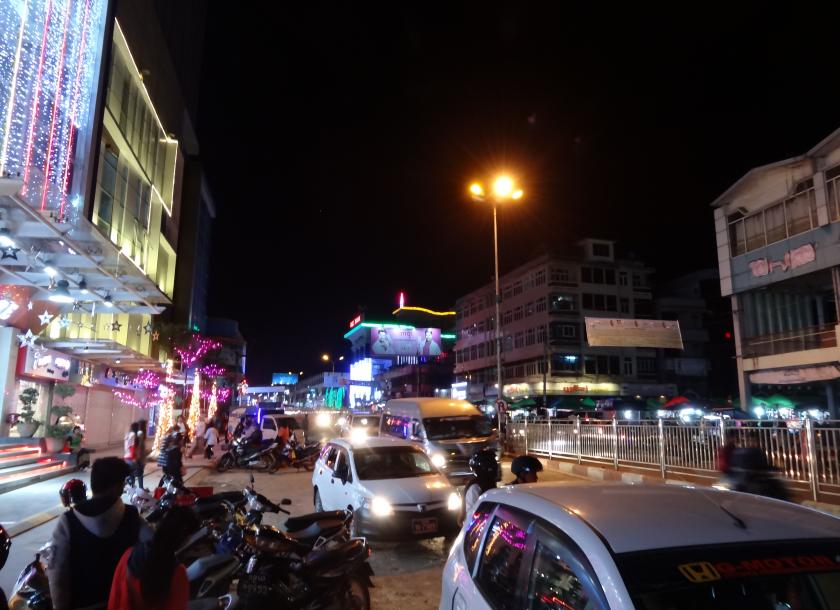Instead of implementing sweeping economic reforms in Shan State, a lot of time and energy was spent on negotiating the composition of the state’s executive and legislature
31 Oct 2017
The political make-up of the state’s executive and legislature results in a lot of time and energy spent on negotiations instead of implementing sweeping economic reforms in Shan, according to a local chamber of commerce.
The state needs political stability and it needs to generate value-added agricultural products in order to grow its economy.
Shan State is the biggest state in Myanmar, covering almost a quarter of the country’s total land mass. It borders Yunnan Province, China, as well as Laos and Thailand.
The most important sector for the entire state is agriculture to the extent that the Shan economy is agriculture-based, U Aung San Win, chair of the Southern Shan State Chamber of Commerce and Industry, told The Myanmar Times in his residence in Taunggyi, where he also shared his thoughts on the reason behind the state’s somewhat stagnant economic development despite its abundant resources in agriculture
The chair said that Shan’s economic development depends very much on agricultural reforms. “The biggest obstacles for Shan’s agriculture are the lack of technology and capital to drive forward improvements and reforms,” he said.
If Shan cannot produce value-added products or commodities, there is limited potential for economic development.
- U Aung San Win, Southern Shan State Chamber of Commerce and Industry
“Germany’s international development organisation, the Gesellschaftfür Internationale Zusamenarbeit [GIZ], is helping Shan’s development of mangoes and tea leaves, whereas Winrock, supported by USAID, is assisting the production of avocados and coffee beans. There is an overseas market demand for avocados,” he added.
Tourism and trade
Tourism also has huge potential in Shan State. Other than the growth of tourism in Inle Lake and its three major urban areas though, the rest of Shan has been held back in tourism development because of the political situation.
“Another important sector which has potential is tourism. Despite our nature and heritage, there are areas where international travellers cannot access,” the chair noted.
The progress of the peacebuilding and political stability are paramount to Shan’s prospect attracting international visitors.
“The road infrastructure is already there, so it’s more about peace and stability. Domestic visitors can travel to the areas but not foreigners,” he went further.
The Om-pu waterfall on Nam Parng river between Laikha and Mong Hsu townships has fallen victim to the political situation, being inaccessible to many foreigners. Some of Shan’s commodities are highly dependent on the Yunnan market, according to the chamber. Half of the corns, for example, are exported to Yunnan, while many beans and pulses are transported to Yangon and then shipped to India.
The major role of border trade means Shan’s economy relies on border security and stability. Last October, China shut down the bank accounts of Myanmar traders and this seriously disrupted the commercial activities. Most of the accounts have been cleared and border trade is now back to normal.
U Aung San Win added that two Israeli companies have investments in Shan’s agriculture but they mainly engage with the government, not local businesses. Thai investors are the top foreign investors in agriculture, whereas Chinese ones are mostly involved in the mining sector.
In addition, the upgrade of Heho airport into an international facility would boost tourism and open up the economy to foreign investments. But, ultimately, the success of these hinge on peace and political stability
Local politics
Indeed, after 1.5 years since the National League for Democracy-led government was formed, Shan has not witnessed much changes to the investments and economy.
“We haven’t seen that much impact on the Shan economy. But we understand that this has to do with the political situation in Shan. Shan is very diverse and has a lot of stakeholders,” the chair said.
“The state government has not engaged a lot with businesses.
“But this is due to the political situation. The Shan State government is NLD, while the majority of the Shan State parliament is taken by the USDP. Hence whatever the state government wants to do, it needs to negotiate a lot with the parliament to seek consensus.
“A lot of time is spent on negotiations,” U Aung San Win observed.
Still, the city is urbanizing fast, and opportunities for growth will only rise. “There is a lot of urbanisation in Taunggyi but the city has not reached its potential as the state capital. At the same time, Lashio and Kengtung are likely to grow very quickly these days,” the chair remarked.
Shan’s urbanisation process will speed up the development of the service economy, especially in the area of education.
“Young people are more eager to study and pursue better education. Some of them go abroad for education while others go to Mandalay and Yangon.”
U Aung San Win was unperturbed at the possible brain drain.
“Young entrepreneurs in our chamber went abroad and came back to work here and contribute to our economy,” he said.
Despite the fact that 70 percent of Myanmar’s border trade goes from Shan to Yunnan, the chair was unaware of any projects or engagements related to China’s Belt and Road Initiative.
(The Myanmar Times: https://www.mmtimes.com/news/political-make-bottleneck-shan-economy.html )











